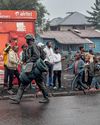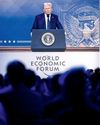
In a sleepy Bosnian town, barely eight kilometres from the border with the EU, an old water tower is falling into ruin. Inside, piles of rubbish, cigarette butts and a portable wood-fired stove offer glimpses into the daily life of the people who briefly called the building home.
Glued on to the walls is another clue: pieces of A4 paper with the same message is printed out again and again: "If you would like to travel to Europe (Italy, Germany, France, etc) we can help you. Please add this number on WhatsApp." The message is printed in the languages of often-desperate people: Somali, Nepali, Turkish, the list goes on. The last translation on the list indicates a newcomer to this unlucky club. It is written in Chinese.
Bihać water tower was once used to replenish steam trains travelling across the former Yugoslavia. Now it provides shelter to those making the perilous journey through the Balkans, with the hope of crossing into Croatia, Bosnia and Herzegovina's neighbour in the EU.
Zhang (not his real name) arrived in Bosnia in April with two young children in tow. The journey he describes as walking "towards the path of freedom" started months earlier in Langfang, a city in China's northern Hebei province. So far it has taken them through four countries, cost thousands of dollars, led to run-ins with the aggressive Croatian border police, and has paused in a temporary reception centre on the outskirts of Sarajevo.
The camp, which is home to more than 200 people, is specifically for families, vulnerable people and unac companied minors. As well as the rows of dormitories set among the rolling Balkan hills, there is a playground and an education centre. But it is a lonely life. It is rare to meet another Chinese speaker.
This story is from the October 04, 2024 edition of The Guardian Weekly.
Start your 7-day Magzter GOLD free trial to access thousands of curated premium stories, and 9,000+ magazines and newspapers.
Already a subscriber ? Sign In
This story is from the October 04, 2024 edition of The Guardian Weekly.
Start your 7-day Magzter GOLD free trial to access thousands of curated premium stories, and 9,000+ magazines and newspapers.
Already a subscriber? Sign In

What is DEI and why is Trump waging war against it?
When American voters headed to the ballot box in November, opinion polls suggested the cost of living, immigration and reproductive rights ranked among their biggest concerns.

Who are M23 rebels and why is there fighting in eastern DRC?
The armed group M23 and Rwandan soldiers entered the centre of Goma last Sunday after weeks of advancing on the main city in the Democratic Republic of the Congo's North Kivu province.

Aid distribution What Israel's ban on Unrwa may mean for Palestinians
Israel this week insisted it would not back down over its plan to close the Gaza operations of the United Nations Relief and Works Agency for Palestine Refugees (Unrwa), even though critics said the move would jeopardise urgent humanitarian aid efforts.

Anti-terror strategy failed to stop a killer
Southport attacker's lack of coherent ideology meant the Prevent scheme did not see him as a potential risk, exposing the need for reform
Last writes
Handwriting is disappearing - we are far more likely to use our hands to type or swipe than pick up a pen. But in the process are we in danger of losing cognitive skills, sensory experience and a connection to history?

I just want to hug those girls' Bittersweet joy and relief as freed soldiers return home
Nineteen-year-old Naama Levy became an indelible symbol of Hamas’s 7 October 2023 attack on Israel.

Eighty years after the liberation of Auschwitz, survivors call for courage amid the rise of hatred and antisemitism 'We must avoid the mistakes of the 1930s'
On a day of startling blue skies, Auschwitz survivors stood before princes and presidents on Monday to remind the world, perhaps for the final time, of the horrors they suffered there during one of the darkest moments of human history.

Davos lessons Trump's return heralds new era of harsh global competition
In the heady mountain air of Davos last week, away from the parties and the backslapping tech bros, another, more beleaguered crew touted their wares: the multilateralists.

Can the continent's publishing industry turn a page?
Tsitsi Dangarembga's Nervous Conditions, a novel about growing up in colonial Zimbabwe, is one of the most important works of 20th-century African literature and features on university curriculums across the UK.

Trump has arrived with abang-but can he follow through?
Little more than a week ago, Stewart Rhodes was serving an 18-year prison sentence for seditious conspiracy over his role in a deadly attack on the US Capitol.